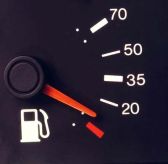From the humble Ford Focus to the exotic Ferrari Enzo; almost all cars require one thing to run: gasoline.
My previous article, “Barbarous: The Brabus S600 Bi-Turbo,” expounded upon how the horsepower race has created some truly vulgar automobiles.
Even more vulgar, however, is the sheer carelessness concerning la situation d’état. Another war, another natural disaster, anything can cause the oil markets to jump and the price at the pump to sky rocket – and stay high.
In the late 1990s, I applauded BMW’s valiant effort to develop a performance oriented 7-Series that ran on hydrogen. The company showed that the technology was indeed here.

However, it seems like the prototype has been sitting in the garage over in Munich ever since.
Last year, Lexus came out with a hybrid RX. The folks over at the Toyota luxury subsidiary called it the RX400 h. The SUV can run to 60mph in under seven seconds.
Point well taken, we can have environmentally friendly products that can haul if need be (and often is desired).
However, the RX400 h has an MSRP of $46,755; that is $10,000 more than the standard RX. The savings in reduced gasoline consumption is a wash, even with Federal tax breaks. Plus, the heavy SUV cannot really run at any speed greater than 15 mph using batteries. Thus, there really is little practical incentive to purchase the hybrid over the gas-only RX.
Mercedes-Benz has reintroduced their diesel E-Class that is on sale everywhere except for diesel-phobic California. Their diesel has a range of upwards of 700 miles per tank and can also sprint to 60mph in under seven seconds.
Benz’s move is less bold than Toyota’s and certainly far less pie-in-the-sky as BMW’s.
However, with all this effort and monetary investment going into sport tuning automobiles to guzzle gas and rip up the roads of the world, everyone must understand that we are, all of us, in a market that is highly susceptible to gas crises.
Short of digging all of Alberta up, there continues to be little prospect of energy independence from nation-states that for the most part do not like the West.
Venezuela, the Arab states, the Russian Federation, Iran- the West relies on their petroleum supplies.
Without their gas, U.S. prices could jump to European-like, economy crushing $5 per gallon or worse. Powerhouses like Brabus and AMG would be sucking wind, while hybridization and alternative fuel conversions would rush to the forefront of consumer need.
The world’s automotive makers need to force alternative energy change into their car lineups lest they find themselves out of gas, out of money, and out of business.
My previous article, “Barbarous: The Brabus S600 Bi-Turbo,” expounded upon how the horsepower race has created some truly vulgar automobiles.
Even more vulgar, however, is the sheer carelessness concerning la situation d’état. Another war, another natural disaster, anything can cause the oil markets to jump and the price at the pump to sky rocket – and stay high.
In the late 1990s, I applauded BMW’s valiant effort to develop a performance oriented 7-Series that ran on hydrogen. The company showed that the technology was indeed here.

However, it seems like the prototype has been sitting in the garage over in Munich ever since.
Last year, Lexus came out with a hybrid RX. The folks over at the Toyota luxury subsidiary called it the RX400 h. The SUV can run to 60mph in under seven seconds.
Point well taken, we can have environmentally friendly products that can haul if need be (and often is desired).
However, the RX400 h has an MSRP of $46,755; that is $10,000 more than the standard RX. The savings in reduced gasoline consumption is a wash, even with Federal tax breaks. Plus, the heavy SUV cannot really run at any speed greater than 15 mph using batteries. Thus, there really is little practical incentive to purchase the hybrid over the gas-only RX.
Mercedes-Benz has reintroduced their diesel E-Class that is on sale everywhere except for diesel-phobic California. Their diesel has a range of upwards of 700 miles per tank and can also sprint to 60mph in under seven seconds.
Benz’s move is less bold than Toyota’s and certainly far less pie-in-the-sky as BMW’s.
However, with all this effort and monetary investment going into sport tuning automobiles to guzzle gas and rip up the roads of the world, everyone must understand that we are, all of us, in a market that is highly susceptible to gas crises.
Short of digging all of Alberta up, there continues to be little prospect of energy independence from nation-states that for the most part do not like the West.
Venezuela, the Arab states, the Russian Federation, Iran- the West relies on their petroleum supplies.
Without their gas, U.S. prices could jump to European-like, economy crushing $5 per gallon or worse. Powerhouses like Brabus and AMG would be sucking wind, while hybridization and alternative fuel conversions would rush to the forefront of consumer need.
The world’s automotive makers need to force alternative energy change into their car lineups lest they find themselves out of gas, out of money, and out of business.


No comments:
Post a Comment